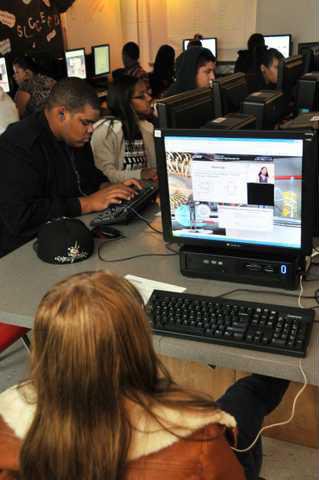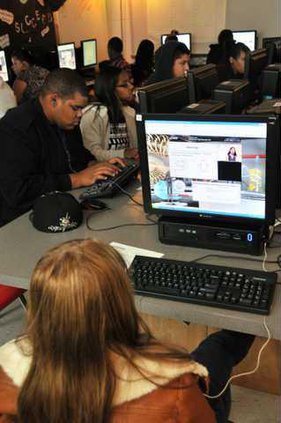If you cannot customize kids to an education, customize an education to them.
That’s the approach Gainesville educators are using to develop a nontraditional high school program to be piloted at Wood’s Mill Academy in January.
Linda Youngblood, director of instruction for Gainesville schools, said she expects about 30 students to participate in the mostly computer-based high school program this spring, but as many as 150 students could participate next fall.
The nontraditional program offers more self-autonomy for students and comes on the heels of a school year when 73 percent of Gainesville High School students graduated, down from 77 percent in the 2007-2008 school year, according to the state Department of Education.
Youngblood said the program will provide students with an opportunity to graduate earlier through E2020 online courses augmented by special teacher-led projects. The program cuts out electives and sports to allow students to graduate with 23 credits instead of 28 credits, as required at Gainesville High. Students in the program will be able to participate in social clubs and other extracurriculars offered at Gainesville High.
“That’s the goal for all of us: how can we get them across the line to graduate and get to the next stage?” Youngblood said. “We have so many kids who still aren’t finishing. ... It’s just a different way to present the material to students.”
The Gainesville City Board of Education approved a 23-credit graduation requirement for the nontraditional program, the minimum required by state law, she said.
Gainesville Superintendent Merrianne Dyer said the school district initiated its nontraditional high school as an alternative to sending Gainesville students to Hall County’s Lanier Career Charter Academy. She said Hall County stopped accepting Gainesville students at the academy because of a possible effect on the county district’s graduation rates.
The new Gainesville program seeks to increase the system’s own graduation rate by offering an educational program that students like.
“Instead of a traditional option of high school, they desire a more technology-based, a more fluid and flexible option for high school,” Dyer said. “They are looking for efficiencies in getting through high school. ... This will be for a few students. Most of our students aren’t in a hurry to go to college. They like to hang around and take more (Advanced Placement) classes.”
Youngblood said the program is actively recruiting recent Gainesville High students who did not graduate and inviting them to apply for the nontraditional program.
All students must apply for the program with parental permission to participate in the school that will operate separately from Gainesville High. Students will be permitted to return to high school if the program is not a good fit.
Lisa Sheehy and Sheryl Williams, both former teachers of the year at Gainesville High, will direct the tentatively titled Wood’s Mill High School program. Sheehy is quick to say the nontraditional program is not an alternative program for students with disciplinary problems, but may be an option for accelerated students or students who want to minimize class time.
“For some students, the structure (of a regular high school) doesn’t fit with them,” Sheehy said. “It’s the chance to do things more on their own terms. ... In Gainesville, we’re big on choice, so this is really another choice for them. We’re creating an environment where a different kind of kid can be successful.”
Sheehy said the program, which will include a poetry cafe and a silent reading room, will mimic a college setting in some ways. Next fall, it may be able to offer an evening program to accommodate students with day jobs. Students also may have opportunities for dual enrollment at Lanier Technical College or Gainesville State College, Youngblood said.
“So then you have all these options for kids so they can come get their education while attending to their obligations outside of class, which are often tremendous,” she said.
Tonya Mize, a Gainesville High School credit recovery teacher, oversees the E2020 credit recovery lab where students complete online courses to earn their high school diploma. She said students who flounder in the traditional high school setting often thrive in the online course lab, where she answers their questions and guides them toward graduation.
“It’s really about preparing them for life after high school,” she said. “The nontraditional is becoming more of what students are wanting. They just prefer that.”
The forthcoming program may also require students to perform community service and intern in a professional field they are considering for a career.
Danny Jones, principal of Lanier Charter Career Academy, said Hall County schools have offered a similar nontraditional day and evening program since 1995 that has been successful. He said the program offers classes from 8 a.m. to 6 p.m., and the computer lab where students take online courses is open until 8 p.m.
“They’re not tied to the clock hours as in a regular classroom,” he said. “And that really appeals to students who are ready to get on to college or who are ready to get on with their careers or move on to Lanier Tech or the military, whatever their plan is.”
Jones said the program can be customized to students’ schedules regarding work, parenthood or transportation issues.
“Our job is to do everything we can to work toward that diploma,” he said. “So that’s what we do.”

